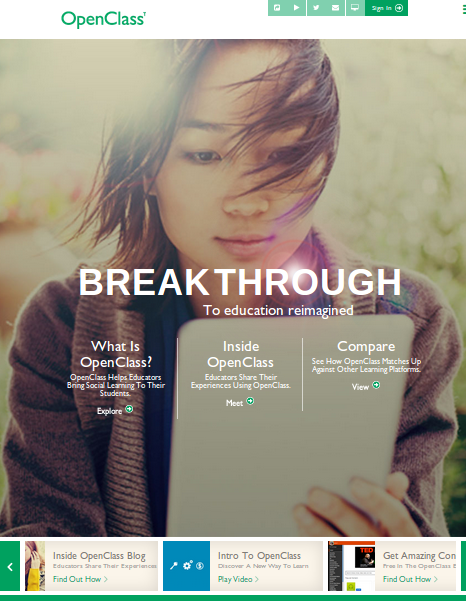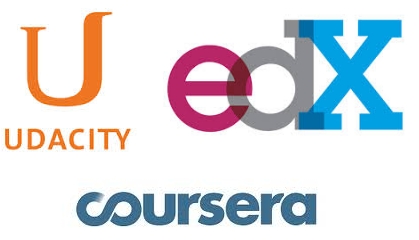Online courses, teacher's view + call to developers
 In this article I will present my view on conducting online courses: what are the players on the Internet, and what, in my opinion, is categorically lacking in RuNet (Au-y, developers!). At the end of the survey.
In this article I will present my view on conducting online courses: what are the players on the Internet, and what, in my opinion, is categorically lacking in RuNet (Au-y, developers!). At the end of the survey.It will be about Learning Management Systems ( LMS ) for individuals. Model situations are as follows:
- The teacher of the circle for middle school students in mathematics in the Palace of Pioneers has several groups. He wants to organize his material and somehow motivate children to do something at home at the computer.
- A university teacher, together with his students, wants to make a human electronic outline of his lectures. With the numbering of figures, table of contents, formulas and similar LaTex'ovkimi jokes.
- (my case) I am physically outside of Russia, I have some kind of teaching material of my own design, I have invested in its design and I want to make it accessible. In return, I just want to amuse my vanity with the number of likes :). How to do it - I have no idea. I recently published a sample lesson on Habré. We calculate what year it is from the Big Bang on Python , and the next lesson will be tomorrow. During the day, he was seen by an order of magnitude more people than I could have hoped for by placing him in some other place. But still Habr is not an ideal place for such material.
So wishes (in random order):
- Site attendance by the target audience,
- available (without special checks for the presence of the trunk),
- free of charge (or very cheap),
- flexible layout options (embedding videos and visualizations, for example, from GeoGebra, numbering formulas, images, etc.),
- Russified interface.
Further briefly for the options that I have reviewed and tested.
')
Haiku & MyHaikuClass (my choice)

www.haikulearning.com
www.myhaikuclass.com
The first is the engine for the school. On average, $ 5-10 per year per student (which is quite good). All standard features are present and in good performance. We are rather interested in this article by their subproject oriented to a separate teacher (MyHaikuClass).
Allows you to create a course page without any checks. There are all sorts of buns, including wikis with access rights, scoring, even integration with Google Drive. Free allows you to create 5 classes and 2GB of space for files. Prices for large accounts are very moderate! Perhaps this is the best option for a small group with several teachers who want to organize their material. Formula support is, but rather primitive.
Of the minuses, perhaps, only the absence of a unified catalog of all courses and the Russian version of the interface. And, of course, the lack of a target audience.
Canvas & Canvas.net

www.instructure.com
www.canvas.net
Similar to the previous one. The first is the engine for the school, the second is something in the spirit of hosting courses.
Canvas.net is very close in ideology to what I would like to see. Anyone can register with a minimum check on the phone (implied affinity with some American educational institution). After, create a course and make it open. At the moment, the site has a couple dozen classes. Among them, there is nothing close to programming / math / physics. That is, as a consequence, the lack of normal work with formulas. Naturally, the project is in English. All these little drawbacks add up and it turns out that Haiku wins.
Google drive

In fact, no one bothers well to organize your Google Drive and store courses there. Communicate with students on Google Hangouts, have common documents, students can share their remote sensing with a teacher, he can make corrections.
A classic and widely used option. Problems with formulas and allocation of rights. The latter could decide the next engine.
Openclass

www.openclass.com/home
LMS add-on over Google Drive with the ability to distribute access rights, rating and so on. Everything is very nice. One “but” requires Google Apps, which has become paid. To get it for free, you have to become a non-profit organization in the USA (501 © (3)), which you don’t want to do because of the abundance of bureaucracy. The paid option does not suit, because the price per student per year will be inadequately high. The rest is a great idea and a good implementation (although at the time of my testing, support for the Cyrillic was naughty, but this is gainful, the engine is developing rapidly). But this is rather a decision not for an individual teacher, but for a school.
Corsera, edX et al.

These and similar sites are not considered at all. They can not get through if you are not affiliated with a large university, and he did not give you money to create a public quality course. The only good news is that Russian universities are gradually connecting to Corser. But, for example, a school teacher with his audience will never be there.
By the way, Edx is even open source (https://github.com/edX), but I’m afraid it would be too rash to use their code.
Various Wiki
The first thing that comes to mind when there is a desire to arrange the material is the use of some Wiki engine. There are many, full of free services. Easy to put yourself. The problem is that only those who have the link will see it. In addition, no tool for normal interaction with the student. The rest is ideal, because plug-ins can achieve any typesetting.
LaTex Online Editors
 Essentially close to the wiki. A tool rather useful for writing scientific articles. There are many different. My choice: Authorea . Perfect for university level, absolutely not suitable for students.
Essentially close to the wiki. A tool rather useful for writing scientific articles. There are many different. My choice: Authorea . Perfect for university level, absolutely not suitable for students.Full-fledged independent engines
Such as Moodle or Drupal with an add-on (for example www.opigno.org ). I mention them exclusively for completeness. The disadvantage of all heavyweights is that it is impossible for a single teacher (or even a school in our realities) to maintain, update and monitor such systems. In addition, in my opinion, they are doomed to extinction. They will be supplanted by the above-mentioned "cloud" candidates.
Social network
It's all pretty obvious. From technical minuses: lack of layout and normal document management, flexible access rights. Of the more abstract - the absence of an atmosphere of learning.
Runet
All the above are foreign resources. What is in RuNet? Completely detached independent sites offering their courses. Everyone has their own engine and approach. To show the diversity (without trying to list everything) I will give examples:
(if I forgot something important - write in a personal, add)
- There are courses from Yandex , HTML Academy , MIPT video lectures , simply sites with collections of lectures ( interneturok.ru , univertv.ru )
- Secondly, an uncountable number of sites in preparation for the exam. Almost everyone sells content. Someone specializes in whole classes (with educational program, DZ, video lectures):
100ege.ru , eftsh.ru and others.
Someone rather provides online tutoring opportunities:
www.tutoronline.ru , gotovkege.ru , college.ru , etc. - Thirdly, there is Dnevnik.ru . Positioned as a school social. network, but you can look inside only through posts on Habré, because you just do not register.
- [added after publication] They sent me several links that I did not know about and which I did not have time to evaluate myself, I will add a description later: intuit.ru , universarium.org , hexlet.org ...
At first glance, they are right at the point of my indignant article, and the absence of their mentioning is my big drawback. So sprinkle ashes on your head.
For me, it is noteworthy that none of the above sites use ready-made solutions. As an example (from my own experience) I can cite www.digitalchalk.com . And a great open source project bigbluebutton.com for recording / broadcasting video lectures / conferences.
Call of developers
Total, in RuNet full sites dedicated to learning. But none of them gives me the opportunity to place my course. In addition, most of them are devoted to their narrow separate topic, whether it be a unified state examination or Excel training. Unfortunately, the spirit of the Courser, where you look through a catalog of various subjects and listen to something out of sincere curiosity and solely for the sake of knowledge, and then discuss it with interested people, is not here. In my opinion, this is just not enough. Western resources, which are devoted to most of the review, can give almost everything except the audience.I think that copying Courser is futile. Such a scale in the Russian-speaking community does not reach (the number of Russian-speaking population does not reach the critical mass). But you can think of a smaller scale. I personally would like to see an implementation similar to MyHaikuClass, in which teachers of schools and various circles, just altruistic teachers and student groups could freely create and place their material in a convenient (and open) form, conduct classes. To all this, a system is needed, which I would call a “exchange of courses”, a social superstructure above all of this, initiating communication and interest in learning. Do I whit up in the clouds or is there really a lack of such a domestic resource? :)
I would be happy to respond to the survey and discussion in the comments.
At the beginning of the article there is a frame from Ivan Maksimov’s cartoon “Provincial School”.
Source: https://habr.com/ru/post/208002/
All Articles